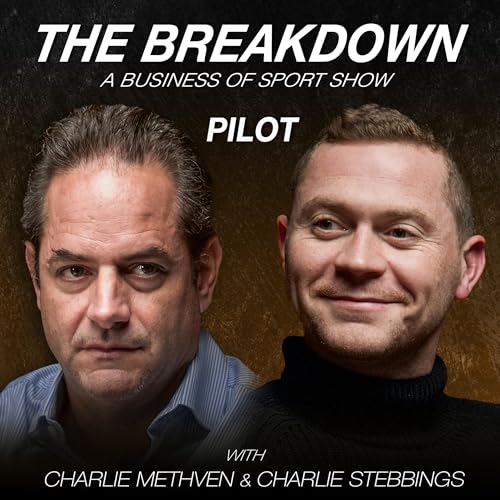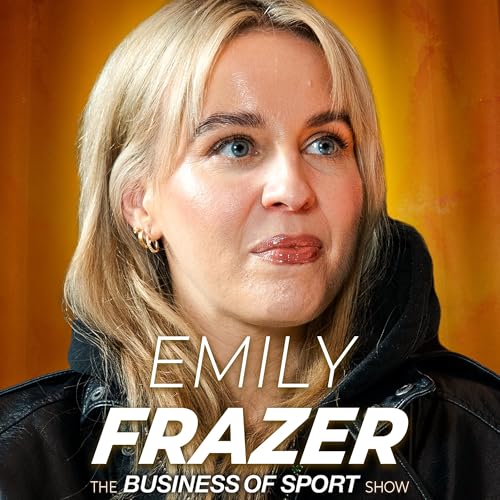Emily Frazer is the CEO of Matchroom Multi Sport. She's led the charge in transforming sports like 9-ball pool into fast-growing, commercially compelling global properties, building new formats, elevating athlete storytelling, and bringing fresh audiences into what we could call a challenger landscape.
The Multi-Sport story was told to perfection in the recent Matchroom Netflix series, shining a light on the lesser known side of the organisation at the centre of the boxing world and driving the boom we’ve seen in the darts. The question for Emily is simple: can the success in these other sports be replicated in the multi-sport model?
Ahead of the Mosconi Cup next week at Ally Pally (pool’s answer to the Ryder Cup), Emily delivers a compelling reveal on life behind the Matchroom curtain and what it’s going to take to deliver an emerging sport on a global stage.
Timestamps:
00:00 Intro
05:01 What is Multi Sport?
16:31 How Early Opportunities Accelerate Learning
20:53 How Did Matchroom Become the “Owner” of the Sport?
26:35 What’s the Master Plan to Make Nine-Ball a Global Sport?
31:46 Is Narrative More Important Than Quality Now?
34:14 The Upcoming Mosconi Cup
36:33 Do Athlete Brands Matter More Than Teams Now?
40:47 Is It Truly a Viable Job for Players?
44:11 Where Matchroom’s Core Revenue in Pool Comes From
49:42 Should Matchroom Create a Unified Fan Loyalty Program?
54:41 Pressure to Match Darts’ Success
59:59 Why Pool Is More Accessible Than Snooker
01:03:09 Quick-Fire Round
On today’s show we discuss:
From ‘Special Events’ to a Global Multisport Division:
How a once-overlooked corner of Matchroom evolved from “the joke department” into one of the company’s fastest-growing verticals.
The commercial blueprint Matchroom is applying, from multi-table events to digital-first broadcasting, social virality and new formats.
The weight of carrying a whole sport on your shoulders, and why Emily believes that “80% crazy” is an essential part of the job.
The belief that with the right innovation, risk, and relentlessness, Pool will become a global powerhouse.
Athletes, Pressure & Player Pathways:
- The human realities of managing athletes in a developing sport. Expectation, frustration, and the emotional weight of leading a tour they rely on to feed their families.
- Why Pool is one of the rare sports where amateurs can face legends, and how that creates powerful fan moments that drive new fandom.
- How the rise of local ranking events has unlocked hidden talent in Vietnam, the Philippines, the U.S. and beyond.
Commercial Strategy, Media & Monetisation:
- The economics of Pool today: ticketing, sponsorship, WNT TV, and the importance of viewership for long-term sustainability.
- Why Pool cannot rely on tradition or federation structures, and must innovate faster and more aggressively than snooker or darts ever did.
- The long-term vision: a profitable global tour, star-driven marketing, and a world where Pool sits alongside darts and snooker in Matchroom’s “big three.”
A huge thank you to our amazing partners on the show:
David
Go and check out the amazing products revolutionising the protein bar at https://davidprotein.com
Stryde
Bringing sports investment opportunities to your door. Visit http://www.gostryde.com to become part of the movement!
Mosconi Cup Tickets
https://www.alexandrapalace.com/whats-on/mosconi-cup/
 Dec 16 20251 h et 8 min
Dec 16 20251 h et 8 min 2 h
2 h Dec 5 202554 min
Dec 5 202554 min 1 h et 20 min
1 h et 20 min Nov 25 20251 h et 16 min
Nov 25 20251 h et 16 min 56 min
56 min 1 h et 14 min
1 h et 14 min 1 h et 30 min
1 h et 30 min
